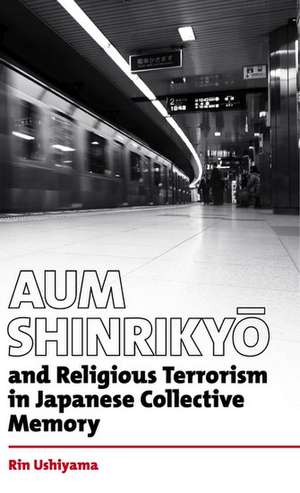Aum Shinrikyō and Religious Terrorism in Japanese Collective Memory.: British Academy Monographs
Autor Rin Ushiyamaen Limba Engleză Hardback – 8 dec 2022
Din seria British Academy Monographs
- 27%
 Preț: 411.05 lei
Preț: 411.05 lei - 27%
 Preț: 471.54 lei
Preț: 471.54 lei - 25%
 Preț: 124.89 lei
Preț: 124.89 lei - 27%
 Preț: 501.53 lei
Preț: 501.53 lei - 22%
 Preț: 188.18 lei
Preț: 188.18 lei - 19%
 Preț: 678.05 lei
Preț: 678.05 lei - 28%
 Preț: 433.04 lei
Preț: 433.04 lei - 19%
 Preț: 627.73 lei
Preț: 627.73 lei - 27%
 Preț: 347.43 lei
Preț: 347.43 lei - 30%
 Preț: 648.07 lei
Preț: 648.07 lei - 30%
 Preț: 652.70 lei
Preț: 652.70 lei - 19%
 Preț: 505.38 lei
Preț: 505.38 lei - 17%
 Preț: 543.30 lei
Preț: 543.30 lei - 30%
 Preț: 543.97 lei
Preț: 543.97 lei - 30%
 Preț: 541.61 lei
Preț: 541.61 lei - 30%
 Preț: 515.91 lei
Preț: 515.91 lei - 18%
 Preț: 321.69 lei
Preț: 321.69 lei - 30%
 Preț: 595.60 lei
Preț: 595.60 lei - 19%
 Preț: 574.20 lei
Preț: 574.20 lei - 28%
 Preț: 376.01 lei
Preț: 376.01 lei - 28%
 Preț: 438.17 lei
Preț: 438.17 lei - 27%
 Preț: 501.93 lei
Preț: 501.93 lei - 29%
 Preț: 520.79 lei
Preț: 520.79 lei - 28%
 Preț: 469.25 lei
Preț: 469.25 lei - 27%
 Preț: 346.13 lei
Preț: 346.13 lei - 30%
 Preț: 544.80 lei
Preț: 544.80 lei - 31%
 Preț: 468.15 lei
Preț: 468.15 lei - 28%
 Preț: 435.50 lei
Preț: 435.50 lei - 30%
 Preț: 602.11 lei
Preț: 602.11 lei
Preț: 346.67 lei
Preț vechi: 502.72 lei
-31% Nou
Puncte Express: 520
Preț estimativ în valută:
66.33€ • 69.26$ • 54.90£
66.33€ • 69.26$ • 54.90£
Carte tipărită la comandă
Livrare economică 24-31 martie
Preluare comenzi: 021 569.72.76
Specificații
ISBN-13: 9780197267370
ISBN-10: 0197267378
Pagini: 230
Ilustrații: 4 figures
Dimensiuni: 160 x 240 x 19 mm
Greutate: 0.5 kg
Editura: OUP OXFORD
Colecția OUP Oxford
Seria British Academy Monographs
Locul publicării:Oxford, United Kingdom
ISBN-10: 0197267378
Pagini: 230
Ilustrații: 4 figures
Dimensiuni: 160 x 240 x 19 mm
Greutate: 0.5 kg
Editura: OUP OXFORD
Colecția OUP Oxford
Seria British Academy Monographs
Locul publicării:Oxford, United Kingdom
Recenzii
Drawing on a remarkably wide range of evidence, Ushiyama sets out a definitive account of a famous modern Japanese tragedy. The book exposes many fundamental aspects of Japan at the present time, while being much more than simply a study of that country alone. It draws out multiple implications for wider sociological analyses of culture, collective memory and trauma, belief, and religion.
The 1995 Tokyo subway attack by the Japanese religious group Aum Shinrikyo was a seismic event that triggered debates about the nature of Japanese society and culture. Rin Ushiyama's book, the first full-length study in English of Japanese memories of and responses to the Aum Affair, is a theoretically nuanced examination that analyses how public intellectuals, political agencies, media concerns, and the victims of Aum reacted to, thought about and remembered Aum's violence. In examining how the Aum Affair has shaped Japan's collective memory, Ushiyama not only sheds light on the nature of contemporary Japan but provides theoretical insights into wider theories about social memory and responses to trauma.
Mistakenly, I believed I had read as much as I needed or wanted to read about Aum Shinrikyo by 2018, when Asahara Shōkō was executed as a result of the 1995 release of sarin gas in the Tokyo subway. Now, however, Dr Rin Ushiyama has taken the action forward by meticulously recording the varied and changing narratives of those affected, both directly and indirectly, by Aum's nefarious actions. Be they perpetrators, victims, officials, media, 'anti-cultists', scholars or intellectual commentators, each contributes to the collective memory and subsequent actions of a traumatised Japan. This is a story well worth telling - and, indubitably, well worth reading.
The book really reads like a story. I was constantly eager to know how the plot would continue. This is especially commendable when taking into account that Ushiyama studies a wide variety of actors, each with their own perspectives on the event.
The book really reads like a story...This is especially commendable when taking into account that Ushiyama studies a wide variety of actors, each with their own perspectives on the event.
Ushiyama's informative and well-articulated work is a valuable contribution to contemporary religious studies that encourages reflection and further scholarly dialogue.
The 1995 Tokyo subway attack by the Japanese religious group Aum Shinrikyo was a seismic event that triggered debates about the nature of Japanese society and culture. Rin Ushiyama's book, the first full-length study in English of Japanese memories of and responses to the Aum Affair, is a theoretically nuanced examination that analyses how public intellectuals, political agencies, media concerns, and the victims of Aum reacted to, thought about and remembered Aum's violence. In examining how the Aum Affair has shaped Japan's collective memory, Ushiyama not only sheds light on the nature of contemporary Japan but provides theoretical insights into wider theories about social memory and responses to trauma.
Mistakenly, I believed I had read as much as I needed or wanted to read about Aum Shinrikyo by 2018, when Asahara Shōkō was executed as a result of the 1995 release of sarin gas in the Tokyo subway. Now, however, Dr Rin Ushiyama has taken the action forward by meticulously recording the varied and changing narratives of those affected, both directly and indirectly, by Aum's nefarious actions. Be they perpetrators, victims, officials, media, 'anti-cultists', scholars or intellectual commentators, each contributes to the collective memory and subsequent actions of a traumatised Japan. This is a story well worth telling - and, indubitably, well worth reading.
The book really reads like a story. I was constantly eager to know how the plot would continue. This is especially commendable when taking into account that Ushiyama studies a wide variety of actors, each with their own perspectives on the event.
The book really reads like a story...This is especially commendable when taking into account that Ushiyama studies a wide variety of actors, each with their own perspectives on the event.
Ushiyama's informative and well-articulated work is a valuable contribution to contemporary religious studies that encourages reflection and further scholarly dialogue.
Notă biografică
Rin Ushiyama is Lecturer in Sociology at Queen's University Belfast, a post he has held since 2021. He holds a PhD in Sociology (2017) from Trinity Hall, University of Cambridge. Previously, he was a British Academy Postdoctoral Fellow at the Department of Sociology, Cambridge, and a Research Fellow at Murray Edwards College, Cambridge. He is currently a Co-Editor of Cultural Sociology (British Sociological Association/SAGE). He is a cultural and political sociologist interested in contested memories of violence, including war, terrorism, and colonialism with a regional focus on East Asia. His latest research investigates historical denial in the context of contemporary Japan and East Asia.
